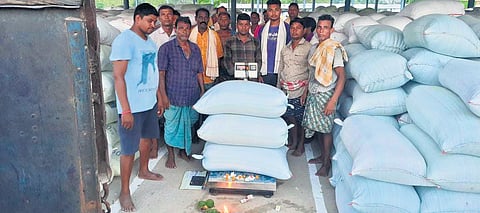

BARGARH: In Bargarh district, the rice bowl of Odisha, a cluster of villages under Bheden block have banded together to protect themselves against exploitation during paddy procurement. Around 1,200-odd farmers under Resham market yard have overcome the challenges of ‘katni chhatni’, creating a unique model of unity, self-reliance and resilience, without depending on the government system.
Come harvesting season and farmers in Odisha face a myriad procurement issues plaguing livelihood and saleability of their harvest. Registration, crop damage due to poor infrastructure at market yards, lack of labour force and trouble with token generation are a few to name.
Topping it all is the practice of ‘katni chhatni’ (deduction) employed by unscrupulous millers and their agents who undercut prices and deduct a certain quantity of paddy on pretexts of quality issues which has triggered a wave of agitations by the farming community over the years.
However, farmers at Resham market yard and three nearby paddy procurement centers (PPCs) including Padhanpali, Sighenpali and Salhehpali have developed an efficient system that ensures smooth procurement. They have joined hands to form a robust network that addresses procurement challenges without relying on government intervention. The farmers by pooling resources and sharing knowledge have created a model that meets government quality standards and fights procurement woes successfully.
The villagers formed committees at each PPC level wherein they collect a token amount of money from every member ahead of the procurement season. Once procurement process starts, the pooled fund is used to hire personnel who guard crops at the market yard. They also employ staff to keep records of paddy dumped at market yard besides token dates of farmers while scheduling procurement in consultation with farmers. Expenses like food for labourers engaged for loading and unloading paddy and protection from rains are met from the fund pool. Until a few years back, getting gunny bags was a problem but farmers shifted to large plastic bags to solve the issue.
The farmers under Resham yard manage to pool around Rs 50,000 each season and by the end of the term, they save Rs 10,000 which is carry forward to the next. This way, they do not have to depend on government for anything.
One of the biggest achievements of this collective is consistent quality of paddy they produce. The farmers are well-versed with government’s fair average quality (FAQ) criteria and meticulously maintain the standards. The diligence has earned them respect and cooperation of rice millers who willingly lift paddy without any deduction.
“Though stability has been achieved in last one decade, it took many more years to bring together all farmers and equip them with awareness to fight exploitation. It was tough to reach out to small farmers but after trial and error, all farmers are now united and work together to solve each other’s problems from the start of cultivation till their harvest is procured,” said Sudam Charan Patra, a farmer under Resham market yard.
Umakanta Naik, a farmer from under Salhehpali PPC said, initially, there were some exploitation by officials and millers but they too have fell in line. “Our unity is the major factor protecting us from exploitation or influence. Every farmer lends a hand in time of need without any discrimination,” he said. In 2020, the farmers successfully protested, twice, seeking regeneration of expired tokens, ensuring no farmer’s produce went unsold due to administrative lapses.
The achievements of Resham market yard and the three nearby PPC farmers has emerged as a model for agricultural communities. Bheden, Kubedega, Saharatikra, Chichinda, Satlama and Tulundi market yards have started adopting the system. Farmers from Sonepur and Balangir districts are visiting Resham to take a leaf out of their book.